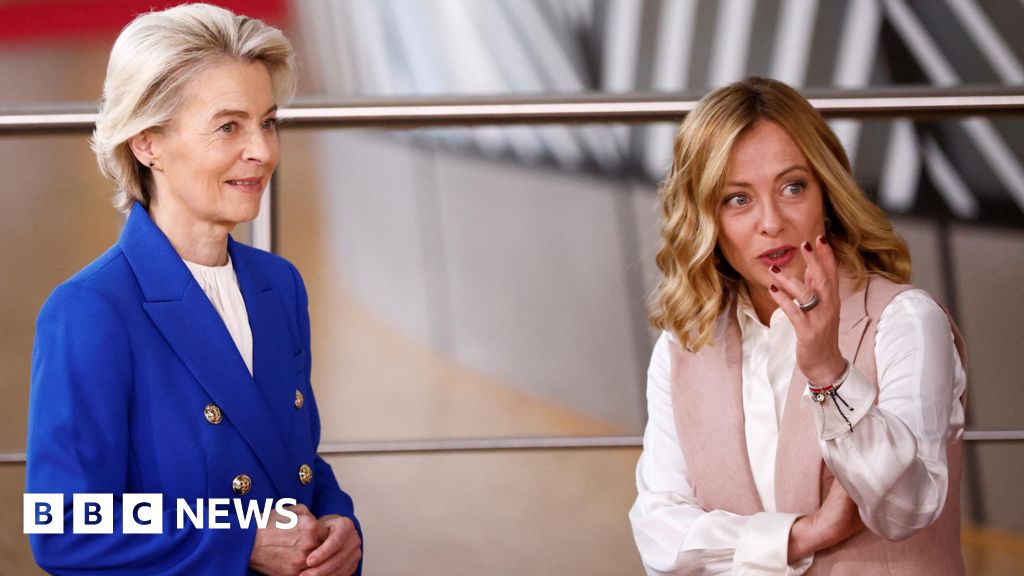
European Commission President Ursula von der Leyen said the bloc could “draw lessons” from Italy’s disputed policy on processing migrants abroad in Albania ahead of a migration-focused EU summit.
She made the comments in a message to member states ahead of a meeting in Brussels on Thursday and Friday, where she said the European Commission would present a new proposal for legislation to increase deportations of migrants.
Von der Leyen – who has just started a second five-year term as president of the European Commission – appears to be responding to pressures on migration from across Europe.
In her letter to member states, she said the return rate of irregular migrants from EU countries is currently only around 20% – meaning the vast majority of people asked to leave an EU member state do not do so.
She said many of them simply stay put or move to another country within the bloc.
All member states must recognize decisions taken by other EU countries to ensure that “migrants who have a return decision against them in one country cannot exploit loopholes in the system to avoid returning elsewhere,” von der Leyen wrote.
Her comments come as Italy launches its long-awaited plan, under which some migrants rescued in the Mediterranean will be sent to Albania for processing.
Earlier this week, 16 men of Bangladeshi and Egyptian descent were transferred from the migrant hotspot in Lampedusa, off the coast of Sicily, to one of two purpose-built centers on the Albanian coast where their asylum claims will be examined.
The centres, which cost around €650m (£547m), were due to open last spring but have suffered long delays. They have been paid for by the Italian government and will be operated under Italian law.
It will house the migrants while Italy considers their asylum applications. Pregnant women, children and vulnerable people will be excluded from the plan.
Political opponents of right-wing Italian Prime Minister Giorgia Meloni as well as several NGOs have criticized Italy’s deal with Albania.
Ricardo Maggi, an MP for the left-wing Europe+ party, said Albania’s scheme was “cruel, useless and expensive”, while the NGO Doctors Without Borders said it was “likely to lead to further harm and human rights violations”.
However, in her speech to MPs on Tuesday, Meloni said the plan was a “new, brave and unprecedented path” that “fully reflects the European spirit”.
The implementation and outcomes of the Albania Agreement will be closely watched by several EU member states, many of which have tried to respond to rising support for far-right parties by toughening their rhetoric and approach to migration.
In the past few weeks alone, Germany has reimposed land border checks, the French government said it would consider tightening immigration legislation, and Poland announced a plan to temporarily suspend asylum for people who cross the border.
Polish Prime Minister Donald Tusk said the controversial move was aimed at preventing Belarus from “destabilizing” Poland by allowing large numbers of migrants into the country.
In France and Germany, it was horrific murders that prompted demands for tougher measures on immigration. A rejected Syrian asylum seeker stabbed three people to death in Solingenwhile A young student was killed by a Moroccan citizen near Paris. In both cases, the killings were carried out by men who had been issued expulsion orders but were not carried out.
Last month, 15 member states signed a proposal from Austria and the Netherlands to improve the “efficiency” of the deportation system.

“Travel specialist. Typical social media scholar. Friend of animals everywhere. Freelance zombie ninja. Twitter buff.”





More Stories
Taiwan is preparing to face strong Typhoon Kung-ri
Israel orders residents of Baalbek, eastern Lebanon, to evacuate
Zelensky: North Korean forces are pushing the war with Russia “beyond the borders”